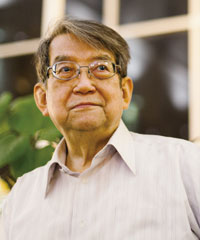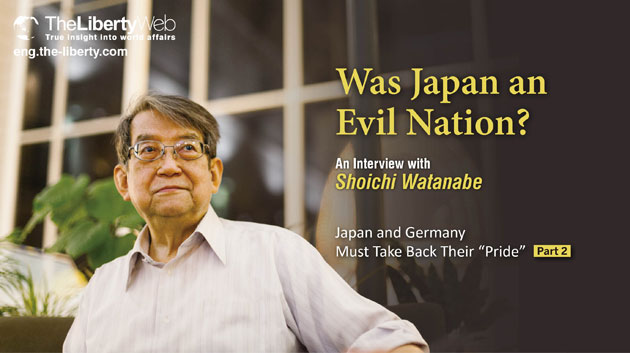Was Japan an Evil Nation?
An Interview with Shoichi Watanabe
After the war, Japan domestically was said to be “an evil nation”. The biggest reasons for this must be the supposed issues of the “Nanjing Massacre” and the “comfort women”. On the issue of the comfort women, it was found through a government investigation in June, that the wording in the “Kono Statement” that recognized the issue was arranged between the Japanese and Korean government of that day, and that it was written without any legitimate background investigation. At last the fact that the “forced entrenchment of the comfort women” is a fictional story has begun to be proven. So, how about the “Nanjing Massacre” then? We asked Shoichi Watanabe, a foremost conservative spokes person, who has been sounding the alarm on the “Tokyo Trial historical perspective”.

Professor Emeritus, Sophia University: Shoichi Watanabe
Born in Yamagata, 1930. ’55 Sophia University Masters Graduate. Exchange student to Germany’s University of Münster, and England’s Oxford University. Professor of Philosophy. Fulbright visiting professor. Professor at Sophia University in 1971. Honorary Doctor of Philosophy degree in ’94 from the University of Münster. Lecturer in wide range of subjects beyond his area of expertise in English philosophy. His numerous works include, “Meishodeyomu Nihonshi” (Ikushosha), and in translation, “A Self Help Thinking (upper and lower volumes)” (Happy Science Publications).
The Possibility of a “Massacre” in Nanjing is Close to Zero
It was with the judgment of the Tokyo Trials that Japan be declared the invading nation in the “Nanjing Massacre”, said to have killed over 200,000 Chinese. This is where the issue first emerged. However, there are many sources that show there never was a massacre.
For instance, Chiang Kai-shek of the Koumington Party, the supposed victims, never once in some 300 international press conferences mentioned any massacre. Furthermore, when the Japanese military air raided Nanjing, the Koumington Party brought to the attention of the League of Nations that a bomb was dropped on a civilian home, but they never protested or mentioned any massacre. Also neither, Mao Zedong of the Chinese Communist Party nor America, Britain, or France ever officially protested. Why is that? That is because no massacre ever occurred.
There was only “One Person” who Witnessed the Massacre
It is true that there were people amongst the Westerners there at the time that insisted there was a “massacre”. The issue is, most of them were not fair or disinterested third parties. For instance, a correspondent for the British paper “Manchester Guardian”, Harold Timperley, an Australian journalist, wrote a book, “What War Means”, half a year after the fall of Nanjing.
The truth of the matter is that although this is the only record of the “Nanjing Massacre”, Timperley had never gone to Nanjing, but wrote the book while receiving money from the Propaganda Department of the Koumington Party. It was clearly anti-Japanese propaganda material (political propaganda).
Furthermore, among the international committee that managed the safety zone in Nanjing, was the American, Reverend Magee. At the hearing for the “Nanjing Massacre” at the Tokyo Trial, these testimonies were considered paramount, but they were all based on hearsay from the Chinese. It is easy to imagine how the anti-Japanese Chinese would relay lies and misinformation in order to discredit the Japanese army and Japan.
As evidence of this, in the cross-examination of Reverend Magee, when questioned about “How many people did you witness being killed?” answered, “One”.
The Koumington Army’s Soldiers killed each other
Or course there were Chinese who were killed, but most of them were “soldiers in ordinary clothes”. Soldiers in ordinary clothes are soldiers who do not wear uniforms but blend in with civilians. They are “guerrilla soldiers”. It cannot be helped that such soldiers would be seen as “bandits” and killed accordingly.
Qualifications for combatants are set by international law. Firstly, there must be a general who will take responsibility for the soldiers; secondly, they must be uniformed so that they are recognizable as soldiers from a distance; thirdly, that they keep their weapons visible, and lastly, that they observe the laws of war.
, The Koumington Party also had “barrier troops”. These troops forced their own soldiers to fight by keeping an eye on them to ensure they are fighting properly, and shot them if they attempted to escape or surrender. The barrier troops shot and killed many Chinese soldiers who were escaping in Nanjing. All of this, too, was attributed to the Japanese army in the alleged “massacre”.
Japan does not have a “Genocidal Ideology”
The level of discipline in the Japanese army at the time was considered to be amongst the top class in the world.
Japan had attacked other cities than Nanjing, such as Qingdao, Beijing, Hankou and Canton, but no alleged “massacres” occurred there. Japan does not have a “genocidal ideology”. It is also true that Chiang Kai-shek did not make Nanjing an open city (note 1), which led to urban warfare, and produced many casualties on both sides.
At the end of June 2014, the exhibition of the Palace Museum of Taiwan started in Tokyo. The cultural property there was originally what Chiang Kai-shek had taken with him from the Forbidden City in Beijing when escaping to Chongqing. At that time, most of the cultural property was left in Nanjing.
Japan had occupied Nanjing for eight years after that, but never touched the cultural property, and left it undamaged. It was Chiang Kai-shek who took it when fleeing to Taiwan. Armies in any country would consider taking valuables as “normal spoils of war” but the Japanese army did not do that. This too should indicate the conciliatory and respectful attitude of the Japanese army, and should reasonably lead one to believe that “the massacre of Chinese civilians by the Japanese army is close to zero in having occurred.”
Within Japan, the debate over the “Nanjing Massacre” has been thoroughly investigated and documented. As a result of this precise research, it has been concluded that the alleged massacre did not take place.
Japan should not continue to apologize for the things we did not do, but rather take its rightful place as a peace-seeking member of the world community demanding the same respect as other world leaders in the international community. Otherwise, in a world seeking truth and justice as we examine World War II, Japan should question whether America, “committed genocide on our citizens in their Tokyo Air Raid that targeted civilians,” and “committed genocide on our citizens when they dropped the atomic bomb on Hiroshima and Nagasaki.”
Against this, the government of Japan has never intentionally attacked civilians as targets. Even in the Pearl Harbor attack by the Kamikaze, the aim was directed at war ships. Unless we state this painful truth, the 3,000,000 war dead in the Yasukuni Shrine cannot rest in peace, nor can world history find the truth.



















